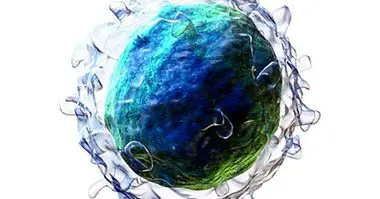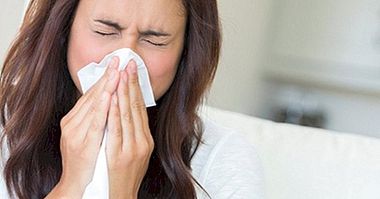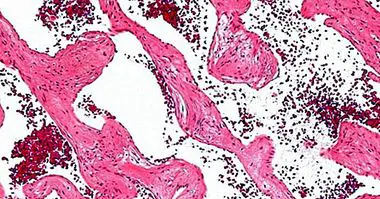14 symptoms and signs of menopause
Menopause. This word is seen by many people as something negative, because it supposes the end of feminine fertility. Other people see it as a liberation, because after it they stop having menstruation.
Regardless of how it is seen, it is an inevitable physiological phenomenon in the life of every woman and in many cases generates various discomforts and symptoms, elements that can signal the arrival of the last of the menstruations.
In this article you can know the 14 symptoms and signs of menopause and its arrival .
- Maybe you are interested: Types of tachycardia: symptoms and possible causes
Menopause: what are we talking about?
It is understood as menopause at the moment in which the last menstruation occurs, calling climacteric to the period of time that goes from the moments before your arrival as to the ones after it. In fact, what is considered menopause itself is the moment in which the last period, the last menstruation, occurs. It is considered that menopause has been reached when you stop having your period for at least one year .
Its origin is the end of the production of estrogen and progesterone in the ovary. With age, the ovaries are aging and the follicles are wearing down, decreasing the amount of the above-mentioned hormones, until there comes a time when no new ovules are released. On average, menopause usually reaches between 45 and 55, although in some cases it can occur early or late.
Menopause can be a turning point, losing who suffers the ability to conceive by traditional methods. This can be a major setback for some people, especially due to the fact that they are reaching old age, the unfulfilled desire to be a mother or the social stigma that implies the loss of the ability to conceive. derived from classic gender stereotypes, a stigma that, although it is becoming smaller, in some sectors of society they still persist.
In this way, problems such as anxiety or depression crisis may appear. However, it is a natural phenomenon that does not have to be seen as something negative, since it does not prevent the realization of any type of activity and may even allow some others to live in a different way.
But menopause does not come suddenly. Even years before, the body already gradually shows signs of ovarian aging , some of which we will see in detail below.
Symptoms and signs of the arrival of menopause
Menopause, as we have indicated previously, is often preceded by various symptoms that indicate the cessation of some of the functions of the female reproductive system and the hormonal change that is taking place in the female body.
The following are a fourteen symptoms and signs of the arrival of menopause. Some of them can be treated medically , especially when they cause intense suffering in the person.
1. Hot flushes
One of the most known symptoms that warns us of the arrival of menopause are those known as hot flashes. It is understood as such those heat waves that begin with a sudden sensation of heat in the thorax and the face to then expand to the whole body. They usually last about four minutes, and sometimes they are followed by trembling and chills.
Hot flashes usually appear some time before menopause and can last until years after the climacteric, being in general the year before cessation of menstruation when they occur more frequently and intensely. They are more common during the night.
2. Irregular menstrual cycles
Menopause is the last menstruation, but before its arrival it is usual for the body to manifest the progressive degeneration of ovarian function. Frequently the period arrives irregularly , varying the dates in which the period arrives and lengthening more and more, although the periods may be shorter it is usual that the amount of menstrual flow is greater than usual (although the opposite is also common).
3. Insomnia and sleep problems
Premenopausal women often have sleep problems, the presence of insomnia being habitual or awakenings during the night. Sometimes these problems are usually facilitated by other symptoms such as hot flashes, but this is not essential.
- Related article: "Combat insomnia: 10 solutions to sleep better"
4. Alterations of mood
The fact of being in a period of hormonal changes makes it easy for the mood to present great variations. Emotional lability and irritability are frequent. In fact, at this stage there is a high risk of depressive symptoms . Some reasons for this are that the person in question wishes to be able to get pregnant or the thought that he is approaching old age.
5. Anxiety
Like the possible presence of depressive symptoms, anxiety is another aspect that is common to find in women in the process of reaching menopause. The decrease in estrogen It can cause other hormones such as dopamine to be reduced, promoting states of stress and anxiety.
6. Weight gain
It is very common that women who are close to reaching menopause or after it tend to gain weight. This is partly due to the hormonal changes that the body undergoes in this period, which facilitate the accumulation of lipids . In addition, the anxiety and mood changes that often accompany the arrival of the climacteric facilitate decompensated intake.
7. Alterations in the level of sexual desire
Another common symptom of the onset of menopause is the presence of alterations in the level of sexual desire. Usually, this decreases due to the drop in estrogen levels. However, it has been reported that in many cases the sexual appetite increases once the menopause has passed, due among other factors to the increase in testosterone that also occurs after the climacteric.
8. Headaches and migraines, vertigo and dizziness
Headache is another relatively common symptom in premenopausal women. They tend to increase especially tension-type headaches , and tend to be more typical in women who suffered from these types of problems previously. Dizziness and vertigo are also relatively common.
- Related article: "The 11 types of headache and its characteristics"
9. Changes in bone density
When reaching menopause, the possibility of suffering from osteoporosis increases, a bone disease in which there is a progressive decrease in the density of the bones and facilitating the existence of fractures . This increased risk is due to the fact that the end of the ovarian function causes an increase in bone resorption (elimination of the tissue, releasing minerals from the bone into the blood).
10. Problems of memory and concentration
The presence of lapses and forgetfulness in the period of time surrounding menopause is very common. The decrease of estrogen and other neurotransmitters, together with the effects produced by conditions such as low mood, usually facilitates the existence of memory failures .
11. Loss and dryness in hair, skin and nails
The decrease of different hormones in premenopausal women is related to the lowering of the collagen level. For this reason, it is frequent skin peeling and drying , as well as the nails and hair become brittle and easy to break.
12. Decreased energy
The difficulties in falling asleep, hormonal changes and the effect of changes in mood and anxiety cause energy levels to drop rapidly. Fatigue appears both physical and mental , and some demotivation may also occur.
13. Urogenital symptoms: Urinary incontinence and vaginal dryness
The fact that there is a progressive loss of estrogen causes different changes in the vagina and in the urogenital system. As far as the vagina is concerned, there tends to be a certain dryness, loss of elasticity and even reduction of the vaginal wall , which in turn can lead to the presence of dyspareunia and avoidance of sexual contact.
As far as incontinence is concerned, some of the hormonal changes make it easier for the bladder to undergo different changes, which facilitate the loss of urine. It is also not uncommon for urinary infections to be more common.
14. Pain in joints
Estrogens have anti-inflammatory effect . Its reduction, therefore, facilitates the presence of inflammations in places such as joints.



















